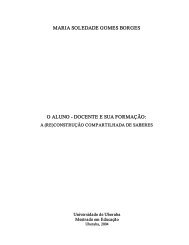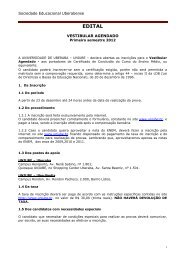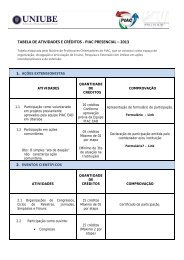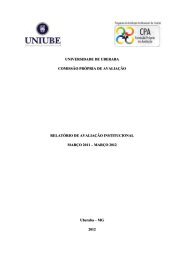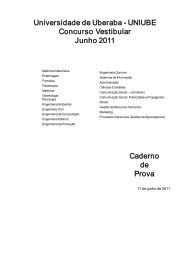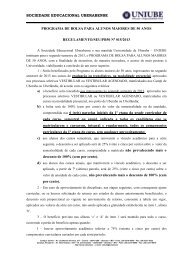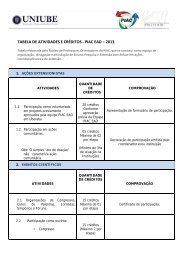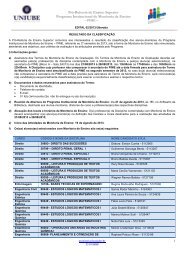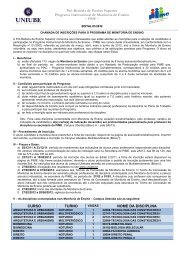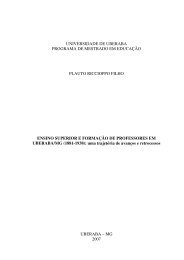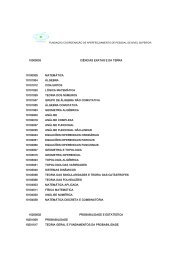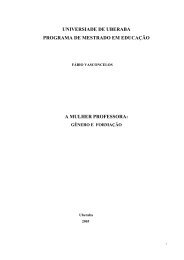Create successful ePaper yourself
Turn your PDF publications into a flip-book with our unique Google optimized e-Paper software.
OS LIMITES DA REGULAMENTAÇÃO DO SISTEMA FINANCEIRO PELO BANCO CENTRAL DO BRASIL<br />
Embora a obra de Carr e demais componentes<br />
reflita a realidade dos anos cinqüenta do século<br />
que se findou, o fato é que, mesmo hoje, não se<br />
pode pensar em retornar ao Estado diretamente<br />
atuante na economia. De outro lado, seu afastamento<br />
total tornaria impraticável o consumo de<br />
bens essenciais pela coletividade, uma vez que a<br />
concorrência estaria comprometida.<br />
2.2 Conceito<br />
Como já assinalado, a regulação consiste em<br />
forma de intervenção do Estado na economia de<br />
forma outra que não a imposição, que engessa a<br />
livre iniciativa, nem sua atuação como empresário.<br />
Não é considerada fácil, entretanto, a definição<br />
do termo regulação pelos autores, qualquer<br />
que seja sua nacionalidade, até mesmo porque<br />
se passa hodiernamente por uma crise no<br />
sistema regulatório clássico.<br />
Segundo Jérôme Gallot, a regulação consiste<br />
numa modalidade de ação pública, essencial à<br />
auto-regulação formulada pelos próprios agentes<br />
do mercado:<br />
“La régulation est d’abord une modalité<br />
de l’action publique. Ce point est essentiel. Si on<br />
parle quelque fois d’‘auto-régulation’, on voit<br />
bien que la régulation nécessite líntervention d’un<br />
tiers , au-dessus de la mêlée, revêtu de la toque<br />
de l’impartialité et de l’independance. C’est ici<br />
qu’il ne faut pas confondre ‘action publique’,<br />
‘État’ et ‘administrations’.” 7<br />
A dificuldade em se conceituar regulação se<br />
dá justamente em virtude de seu crescimento,<br />
decorrente de vários aspectos , os quais não<br />
podem ser reduzidos a uma única definição.<br />
Desta maneira, a regulação pode ser estudada<br />
sob diversos ângulos, entre os quais destacam<br />
Baldwing, Scott e Hood: a regulação como regras-objetivo,<br />
como intervenção direta do Estado<br />
na economia e como abrangência de todos os<br />
mecanismos de controle social, por quem quer<br />
que os exerça. Sobre cada um dos três aspectos<br />
colocam os autores:<br />
“At its simplest, regulation refers to the<br />
promulgation of an authoritative set of rules,<br />
accompanied by some mechanism, typically a<br />
public agency, for monitoring and promoting<br />
compliance with these rules. Rule-making and<br />
95<br />
UNIJUS<br />
monitoring/enforcement mechanisms need not<br />
be located in a single institution.<br />
(...)<br />
“A second, broader, conception of<br />
regulation, commonly found in the political<br />
economy literature, takes in all the efforts of<br />
state agencies to steer the economy. Thus, while<br />
rule-making and application through<br />
enforcement systems would come within such a<br />
definition, a wide range of other government<br />
instruments based on government authority such<br />
as taxation and disclosure requirements might<br />
also be included. Even those government tools<br />
which rely on government expenditure or direct<br />
organization such as contracting and public<br />
ownership might be considered as alternative<br />
tools of regulation. Such na approach has the<br />
merit that a variety of tools are considered as<br />
possible alternatives to traditional command and<br />
control type regulation” (...) “so that where rulemaking<br />
seems to be inappropriate as a means<br />
for achieving policy objectives, other tools may<br />
be used.” (...) “Nor should regulation be seen as<br />
devoted only to restriction: an important aspect<br />
of regulation may be enablement – the creation<br />
not merely of incentives but of those conditions<br />
that allow activities to take place.<br />
(...)<br />
“A third definition, broader still, considers<br />
all mechanisms of social control – including<br />
unintentional and non-state processes – to be<br />
forms of regulation.” (...) “Furthermore a wide<br />
range of activities which may involve legal or<br />
quasi-legal norms, but without mechanisms for<br />
monotoring and enforcement, might come within<br />
the definition.”<br />
(...)<br />
“Taking into account the third definition we<br />
see the importance of the activities of business<br />
and their professional advisers in shaping<br />
regulation fields, both in terms of policy-making<br />
and implementation.” 8<br />
Portanto, a regulação inclui as regras a serem<br />
cumpridas no sentido de atingir as metas<br />
prefixadas, as instituições e instrumentos através<br />
dos quais tais regras operacionalizar-se-ão,<br />
os incentivos e, em especial, material humano<br />
<strong>capa</strong>z de lidar com as especificidades de cada<br />
setor a ser regulado.<br />
____________________<br />
7 GALLOT, Jérôme. Qu’est-ce que la régulation? Contribution pour une définition. Revue de la Concurrence et de la Consommation, Paris, n. 119,<br />
jan./fev. 2001, p. 5.<br />
8 BALDWING, Robert; SCOTT, Colin; HOOD, Cristopher. A reader on regulation. New Jersey: Oxford University Press, 1994. p. 3-4.



